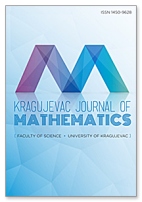Lipschitz Stability for Impulsive Riemann–Liouville Fractional Differential Equations
 Download PDF
Download PDF
Authors: M. BOHNER AND S. HRISTOVA
DOI: 10.46793/KgJMat2405.723B
Abstract:
Initial and impulsive conditions for initial value problems of systems of nonlinear impulsive Riemann–Liouville fractional differential equations are introduced. The case when the lower limit of the fractional derivative is changed at each time point of the impulses is studied. In the case studied, the solution has a singularity at the initial time and at any point of the impulses. This leads to the need to appropriately generalize the classical concept of Lipschitz stability. Two derivative types of Lyapunov functions are utilized in order to deduce sufficient conditions for the new stability concept. Three examples are provided for illustration purpose of the theoretical results.
Keywords:
Impulses, Riemann–Liouville derivative, generalized Lipschitz stability in time, Lyapunov functions.
References:
[1] R. Agarwal, S. Hristova and D. O’Regan, Non-Instantaneous Impulses in Differential Equations, Springer, Cham, 2017. https://doi.org/10.1007/978-3-319-66384-5
[2] R. Agarwal, S. Hristova, D. O’Regan and R. Terzieva, Stability properties of neural networks with non-instantaneous impulses, Math. Biosci. Eng. 16 (2019), 1210–1227. https://doi.org/10.3934/mbe.2019058
[3] R. Agarwal, D. O’Regan and S. Hristova, Stability of Caputo fractional differential equations by Lyapunov functions, Appl. Math. 60 (2015), 653–676. https://doi.org/10.1007/s10492-015-0116-4
[4] R. P. Agarwal, S. Hristova and D. O’Regan, Lipschitz stability for non-instantaneous impulsive Caputo fractional differential equations with state dependent delays, Axioms 8 (2019), Article ID 4.
[5] R. P. Agarwal, S. Hristova and D. O’Regan, Exact solutions of linear Riemann-Liouville fractional differential equations with impulses, Rocky Mountain J. Math. 50 (2020), 779–791. https://doi.org/10.1216/rmj.2020.50.779
[6] R. P. Agarwal, S. Hristova and D. O’Regan, Existence and integral representation of scalar Riemann-Liouville fractional differential equations, Mathematics 8 (2020), Article ID 607.
[7] G. Alessandrini, M. V. de Hoop, R. Gaburro and E. Sincich, Lipschitz stability for a piecewise linear Schrödinger potential from local Cauchy data, Asymptot. Anal. 108 (2018), 115–149. https://doi.org/10.3233/asy-171457
[8] A. Anguraj, S. Kanjanadevi and J. J. Nieto, Mild solutions of Riemann-Liouville fractional differential equations with fractional impulses, Nonlinear Anal. Model. Control 22 (2017), 753–764. https://doi.org/10.15388/na.2017.6.2
[9] D. D. Bainov and I. M. Stamova, Lipschitz stability of impulsive functional-differential equations, ANZIAM J. 42 (2001), 504–514. https://doi.org/10.1017/S1446181100012244
[10] M. Bellassoued, D. Jellali and M. Yamamoto, Lipschitz stability for a hyperbolic inverse problem by finite local boundary data, Appl. Anal. 85 (2006), 1219–1243. https://doi.org/10.1080/00036810600787873
[11] E. Beretta and E. Francini, Lipschitz stability for the electrical impedance tomography problem: the complex case, Comm. Partial Differential Equations 36 (2011), 1723–1749. https://doi.org/10.1080/03605302.2011.552930
[12] R. Chaudhary and D. N. Pandey, Monotone iterative technique for impulsive Riemann-Liouville fractional differential equations, Filomat 32 (2018), 3381–3395. https://doi.org/10.2298/fil1809381c
[13] Q. Chen, A. Debbouche, Z. Luo and J. Wang, Impulsive fractional differential equations with Riemann-Liouville derivative and iterative learning control, Chaos Solitons Fractals 102 (2017), 111–118. https://doi.org/10.1016/j.chaos.2017.03.024
[14] S. I. Choi and Y. H. Goo, Uniformly Lipschitz stability and asymptotic property in perturbed nonlinear differential systems, J. Korean Soc. Math. Educ. Ser. B Pure Appl. Math. 23 (2016), 1–12. https://doi.org/10.7468/jksmeb.2016.23.1.1
[15] F. M. Dannan and S. Elaydi, Lipschitz stability of nonlinear systems of differential equations, J. Math. Anal. Appl. 113 (1986), 562–577. https://doi.org/10.1016/0022-247X(86)90325-2
[16] S. Das, Functional Fractional Calculus, Second Edition, Springer-Verlag, Berlin, 2011. https://doi.org/10.1007/978-3-642-20545-3
[17] K. Diethelm, The Analysis of Fractional Differential Equations, Lecture Notes in Mathematics 2004, Springer-Verlag, Berlin, 2010. https://doi.org/10.1007/978-3-642-14574-2
[18] M. Fečkan, Y. Zhou and J. Wang, On the concept and existence of solution for impulsive fractional differential equations, Commun. Nonlinear Sci. Numer. Simul. 17 (2012), 3050–3060. https://doi.org/10.1016/j.cnsns.2011.11.017
[19] Y. L. Fu, On Lipschitz stability for F.D.E, Pacific J. Math. 151 (1991), 229–235. http://projecteuclid.org/euclid.pjm/1102637079
[20] J. Hale, Theory of Functional Differential Equations, Second Edition, Springer-Verlag, New York-Heidelberg, 1977.
[21] S. Hristova, S. Tersian and R. Terzieva, Lipschitz stability in time for Riemann-Liouville fractional differential equations, Fractal and Fractional 5 (2021), Artticle ID 37, 12 pages. http://dx.doi.org/10.3390/fractalfract5020037
[22] A. A. Kilbas, H. M. Srivastava and J. J. Trujillo, Theory and Applications of Fractional Differential Equations, Elsevier Science B.V., Amsterdam, 2006.
[23] V. Lakshmikantham, D. D. Baĭnov and P. S. Simeonov, Theory of Impulsive Differential Equations, World Scientific Publishing Co., Inc., Teaneck, NJ, 1989. https://doi.org/10.1142/0906
[24] Y. Liu, Studies on impulsive differential models with multi-term Riemann-Liouville fractional derivatives, J. Appl. Math. Comput. 52 (2016), 529–565. https://doi.org/10.1007/s12190-015-0953-z
[25] M. Machida and M. Yamamoto, Global Lipschitz stability in determining coefficients of the radiative transport equation, Inverse Problems 30 (2014), Article ID 035010, 16 pages. https://doi.org/10.1088/0266-5611/30/3/035010
[26] I. Podlubny, Fractional Differential Equations, Academic Press, Inc., San Diego, CA, 1999.
[27] D. Qian, C. Li, R. P. Agarwal and P. J. Y. Wong, Stability analysis of fractional differential system with Riemann-Liouville derivative, Math. Comput. Modelling 52 (2010), 862–874. https://doi.org/10.1016/j.mcm.2010.05.016
[28] A. E.-K. A. Soliman, On Lipschitz stability for comparison systems of differential equations via limiting equation, Appl. Math. Comput. 163 (2005), 1061–1067. https://doi.org/10.1016/j.amc.2004.06.074
[29] I. Stamova and G. Stamov, Lipschitz stability criteria for functional differential systems of fractional order, J. Math. Phys. 54 (2013), Article ID 043502, 11 pages. https://doi.org/10.1063/1.4798234
[30] J. Vasundhara Devi, F. A. Mc Rae and Z. Drici, Variational Lyapunov method for fractional differential equations, Comput. Math. Appl. 64 (2012), 2982–2989. https://doi.org/10.1016/j.camwa.2012.01.070
[31] W. Yukunthorn, S. K. Ntouyas and J. Tariboon, Impulsive multiorders Riemann-Liouville fractional differential equations, Discrete Dyn. Nat. Soc. (2015), Art. ID 603893, 9 pages. https://doi.org/10.1155/2015/603893
[32] X. Zhang, W. Ding, H. Peng, Z. Liu and T. Shu, The general solution of impulsive systems with Riemann-Liouville fractional derivatives, Open Math. 14 (2016), 1125–1137. https://doi.org/10.1515/math-2016-0096
